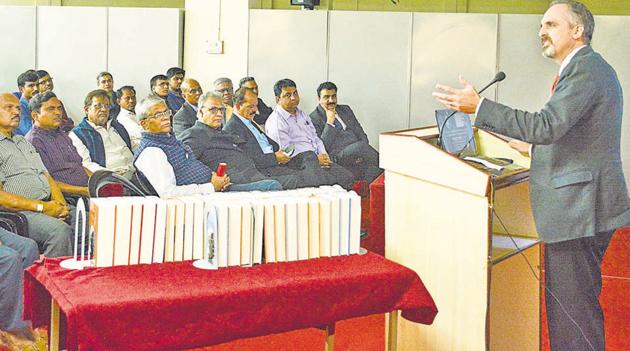Campus Connect: Centre for Dewey Studies in India opens at SPPU in collaboration with University of Texas
The centre has been launched in collaboration with the University of Texas, USA, and was inaugurated at the Department of Dr Babasaheb Ambedkar Studies (DBAS), Savitribai Phule Pune University (SPPU), on Thursday, by SPPU vice-chancellor Prof Nitin Karmalkar
Pune – Caste as a habit, force as a paradox and religion as a means”. Prof Scott Stroud, director of Media Ethics, centre for media engagement, University of Texas, at Austin, Texas, laid out for a packed house at the Savitribai Phule Pune University (SPPU), on Thursday, the key foundations of American philospher and former Columbia University professor, John Dewey, that influenced and formulated the thinking of Dr Babasaheb Ambedkar.

Dewey was Ambedkar’s professor when the latter studied at the Columbia varsity in the US.
“Dr Ambedkar learnt many things from John Dewey, like key concepts in Ambedkar’s pragmatism were caste as a habit, force as a paradox and religion as a means. Sustainable problem solving is base of the John Dewey’s philosophy,” Prof Stroud said, as he delivered the Dr Babasaheb Ambedkar Memorial lecture on the ocassion of the launch of the centre for Dewey Studies in India.
The centre has been launched in collaboration with the University of Texas, USA, and was inaugurated at the Department of Dr Babasaheb Ambedkar Studies (DBAS), Savitribai Phule Pune University (SPPU), on Thursday, by SPPU vice-chancellor Prof Nitin Karmalkar.
Speaking on “Babasaheb Ambedkar, John Dewey and the unfinished Story of Pragmatism in India”, Prof Stroud, said, “Today is a historical moment, as such a unique centre has been opened. Prof Dewey, in my opinion, is the foremost philosopher in America. The goals to start this centre are to enhance knowledge and research concerning John Dewey and his connection with the India. When you read Dewey’s work, it’s very complex and your whole life will not be enough to learn about it. Four general themes of his work are: Experience matters; community is important; theories are tools and science is useful; and pluralism, not foundationalism.”
Prof Scott added: “Dewey’s mistake was not coming to India ever in his life. If he had come to India then he would have radically noticed the religion and caste structure which is everywhere in the country. Dr Ambedkar in Columbia was influential for two reasons - social and Intellectual. There are many professors at Columbia University who influenced and shaped the mind of Dr Babasaheb Ambedkar.”
Former chairman of the Sukhadeo Thorat University Grants Commission (UGC) Kailas Kanse; and managing director, of the Dr Babasaheb Ambedkar Research and Training Institute (Barti), Prafulla Pawar, were present for the lecture.
The John Dewey Society has donated 38 volumes of books written by John Dewey to the centre.
“The Centre for Dewey Studies has already been established in America, Germany, Italy, Hungary, Poland, Japan, Turkey and China. This is the first in India, wherein thoughts of John Dewey and Dr Babasaheb Ambedkar will be disseminated. During the period 1913 to 1916, when Dr Ambedkar was pursuing his education in Columbia University, John Dewey was his professor. Hence, this centre is established,” said Vijay Khare, director, international centre, SPPU.
Prof Karmalkar said, “Looking at the kind of work produced by Prof Dewey, there are many aspects to it. This treasure is now getting opened to all students and the contents in these books will be part of your future research. It will keep on inspiring us in the coming years and provide many opportunities to students in their careers.”





